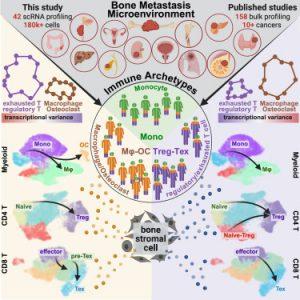A new study reveals the diverse immune landscapes of bone metastases using RNA sequencing (Figure 1). By analysing samples from eight different cancer types, the team identified three distinct immune ecosystem archetypes that could reshape how metastases are understood and treated.
Study Highlights
| Samples | 42 bone metastases from 8 cancer types |
| Method | Bulk RNA sequencing and immunofluorescence |
| Validation | 158 public RNA-seq datasets from 10 cancer types |
Key Findings
Researchers identified three immune ecosystem archetypes:
- Macrophage/Osteoclast-rich Archetype
- Enriched in bone-resorbing immune cells
- Linked to the traditional osteoclast-targeting therapies
- Regulatory and Exhausted T Cell Archetype
- Suggests immune dysfunction
- May benefit from T cell reactivation therapies
- Monocyte-enriched Archetype
- Involves early-stage immune cells that could influence inflammation and progression
Convergent vs. Divergent Evolution
Interestingly:
- Metastases from the same cancer type often fell into different archetypes
- Metastases from different cancers sometimes shared the same archetype
This suggests:
- Convergent evolution: Different cancers adopt similar bone colonization tactics
- Divergent evolution: Cancers from the same origin evolve independently in bone
Therapeutic Implications
| Archetype | Suggested Treatment Strategy |
| Exhausted T cell | Immune checkpoint inhibitors or T cell activators |
| Macrophage/Osteoclast | Current anti-resorptive therapies may apply |
This research shows the value of studying cancers across types. Once they spread to the bone, their original differences begin to fade, allowing us to explore how various cancers adapt and interact within the same environment.
Journal article: Liu., F., et al, 2025. Single-cell profiling of bone metastasis ecosystems from multiple cancer types reveals convergent and divergent mechanisms of bone colonization, Cell Genomics.
Summary by Stefan Botha











